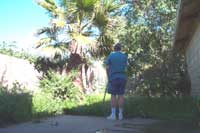|
Monday, May 29, 2000
|
There are a couple of ways you can look at a movie like Frequency. You can take the "what if someone had killed Hitler in his cradle" approach and examine the domino effect of each great historical moment on the next. Or you can look more closely at your own life, and notice how each action you take affects your world and the people in it. This is what two of my favorite movies, Groundhog Day and Sliding Doors, do so well. They crystallize each moment in time and give you the sense that people matter, and actions have an impact.
What I liked most about Frequency was the feeling that family and friends are important, and we should cherish each moment we have with the people in our lives. The characters in the film, especially the father and son played by Dennis Quaid and James Caviezel, have a strong relationship that develops into something even deeper as they live their parallel lives, each trying to do the right thing and make the world better for the other. When an action has the wrong effect, they feel the other's hurt deeply and try to set things right.
This is difficult enough for characters living thirty years apart from each other. If we start today and think about how we can make the world safer for our children, or more comfortable for our parents, we can look forward to a future with fewer regrets. It's the things we could have done but didn't, or shouldn't have done but did, that can give us that bitter feeling when, thirty years or thirty minutes later, we wish we could go back and change history. This kind of film is a reminder to do the right thing now, before it's too late.
Now, that doesn't mean I try to manage my life in a way that puts every moment under a microscope. But I have to be aware that a mean word can lead to a hurt feeling, and every rift in the fabric of a relationship takes its toll. We can be kind to each other, think of each other, and live as part of a family, and part of a community. All it takes is remembering that it's almost as hard to overcome a thoughtless cruelty as it would be to go back in time and change it. |
|
 So yes, I did get out of the house, and I was able to sit through a movie without much discomfort. I was determined to do this, but I frankly wasn't sure I'd make it. I could feel my back tightening as the opening titles rolled, but I found a position that let me cope, and by the end of the movie I had no pain. I even got some work done today, and I got my overgrown lawn watered down so that it'll stay green. I'm waiting for a call from a gardener, to see if the yard can be transformed into something I can cope with. So yes, I did get out of the house, and I was able to sit through a movie without much discomfort. I was determined to do this, but I frankly wasn't sure I'd make it. I could feel my back tightening as the opening titles rolled, but I found a position that let me cope, and by the end of the movie I had no pain. I even got some work done today, and I got my overgrown lawn watered down so that it'll stay green. I'm waiting for a call from a gardener, to see if the yard can be transformed into something I can cope with.
|
|
A few thoughts about Frequency:
- I was happy to see that the film doesn't try to explain or make sense of the connection between the two realities of 1969 and 1999. The effect of the Northern Lights is given as the reason for the time-shift phenomenon, without any attempt at a "scientific" explanation. The lack of detail makes the premise easier to accept, since there's so little to analyze and pick apart. I liked being able to buy into what was happening without having to question the basis for it.
- This was an interesting approach to the question of parallel universes, the notion that every past action has an effect that shows up at exactly the same point in time in the future, relative to a given start point. What Back to the Future did as a lark, this movie is deadly serious about. It makes for a dynamic tension that gives the plot its momentum.
- Above all, this is a really good caper movie, a detective story with a twist. The clues are there, along with the red herrings. When surprises are revealed, there isn't any sense that you've been tricked or betrayed.
- The cast is full of lesser known actors who do a marvelous job, bringing a kind of independent feeling to the film. There's no overplaying by anyone on the screen. And the movie has Andre Braugher, which is always a plus.
- The action sequences, especially the opening fire rescue, are gripping and vivid. The parallel fighting scenes at the end are pulled together neatly.
- The plot is involved, but neither obscure nor over-explained. Just about the right amount of detail is revealed to keep you from being so baffled that you tune out. But it's not so transparent that you feel you're being pandered to or patronized.
|
|

